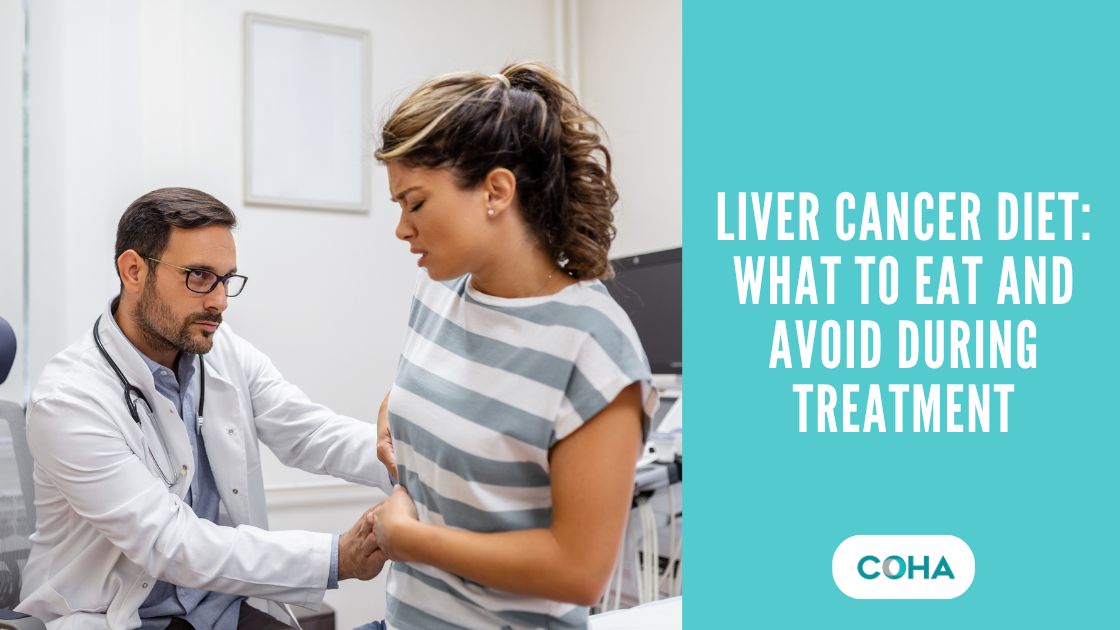


Liver cancer, particularly hepatocellular carcinoma (HCC), poses significant health challenges and is one of the leading causes of cancer-related deaths globally. With treatment options ranging from surgery and chemotherapy to targeted therapies, patients often face a complex journey. During this time, nutrition becomes crucial in enhancing treatment outcomes and overall well-being. A well-structured diet can help manage symptoms, maintain strength and support recovery. We offer personalized guidance, valuable resources, and support for patients navigating cancer care.
Liver cancer arises from the uncontrolled growth of liver cells, often associated with chronic liver diseases such as hepatitis B and C or cirrhosis. The diagnosis of liver cancer can be overwhelming, and the subsequent treatment can significantly impact a patient's nutritional status.
Common treatment modalities include:
Chemotherapy: This approach uses powerful drugs to kill cancer cells or inhibit their growth. While effective, chemotherapy can lead to side effects such as nausea, vomiting, and changes in appetite.
Surgery: In cases where the cancer is localized, surgical options may involve removing a portion of the liver (partial hepatectomy) or a liver transplant.
Targeted Therapy: This innovative treatment focuses on specific molecular targets associated with cancer growth, potentially minimizing damage to healthy cells.
These treatments can profoundly affect appetite, digestion, and nutrient absorption. Patients may experience side effects that complicate dietary choices, including nausea, fatigue, altered taste sensations, and difficulty swallowing. As a result, there is a heightened risk of malnutrition among liver cancer patients.
A balanced liver cancer diet should focus on several critical principles:
Small, Frequent Meals
Eating five to six small meals throughout the day can help maintain energy levels and reduce feelings of nausea. Smaller portions are often easier to tolerate than larger meals.
Hydration
Staying well-hydrated is essential during treatment. Dehydration can exacerbate fatigue and other symptoms. Aim for at least 8-10 cups of fluids daily unless otherwise advised by a healthcare professional.
Examples: Chicken, turkey, fish, eggs, low-fat dairy.
Benefits: Lean proteins are vital for supporting immune function and healing. They provide essential amino acids necessary for tissue repair and muscle maintenance. Including protein-rich foods in each meal can help combat muscle wasting often seen in cancer patients.
Examples: Brown rice, whole wheat bread, oats.
Benefits: Whole grains are an excellent source of energy and dietary fiber. They help regulate blood sugar levels and promote digestive health. Incorporating whole grains into meals can provide sustained energy throughout the day.
Fruits and vegetables should be a cornerstone of any diet for liver cancer patients. Focus on colorful varieties rich in antioxidants.
Examples: Berries (blueberries, strawberries), cruciferous vegetables (broccoli, cauliflower), and leafy greens (spinach, kale).
Benefits: These foods help combat oxidative stress and support overall health by providing essential vitamins and minerals. Antioxidants play a crucial role in protecting cells from damage caused by free radicals.
Sources: Avocados, nuts (almonds, walnuts), seeds (chia seeds, flaxseeds), olive oil.
Benefits: Healthy fats aid in nutrient absorption and provide essential fatty acids that support overall health. They can also enhance the flavor and palatability of meals, making it easier for patients to eat.
Maintaining adequate fluid intake is critical during treatment. Water is the best choice; however, herbal teas or broths can contribute to hydration while providing additional nutrients.
While focusing on what to eat is essential, it's equally crucial to know what to avoid:
Alcohol
Alcohol should be avoided completely as it can exacerbate liver damage and interfere with treatment efficacy. Even small amounts can have detrimental effects on liver function.
Processed Foods
Processed foods are often high in sugar, salt, and unhealthy fats. These foods can worsen symptoms such as nausea or fatigue. Examples include:
These items not only lack nutritional value but also may contribute to inflammation in the body.
Certain Supplements
Patients should exercise caution with unapproved supplements that may interfere with treatment protocols or cause adverse effects. Always consult with healthcare providers before starting any new supplement regimen.
Specific Foods to Include
In addition to general dietary guidelines, certain foods can provide specific benefits for liver health:
Legumes
Legumes such as beans and lentils are rich in fiber and protein. They are beneficial for digestive health and help maintain stable blood sugar levels.
Benefits: High fiber content promotes regular bowel movements while providing essential nutrients without excessive calories.
Fatty Fish
Fatty fish like salmon and mackerel are excellent sources of omega-3 fatty acids.
Benefits: Omega-3s have anti-inflammatory properties that may help protect against liver disease progression. They also support heart health—an important consideration for cancer patients.
Antioxidant-Rich Foods
Incorporating antioxidant-rich foods into the diet protects liver cells from damage.
Examples: Garlic (known for its immune-boosting properties), green tea (rich in catechins), and berries (high in vitamins C and E). These foods enhance flavor and provide protective effects on the liver while supporting overall health.
Individualized Nutrition Plans
Given the complexity of liver cancer treatment and its impact on nutrition, consulting with healthcare providers for personalized dietary recommendations is crucial. Registered dietitians play an essential role in managing nutrition during treatment by:
A tailored diet during liver cancer treatment is essential for managing symptoms effectively and enhancing recovery outcomes. Patients are encouraged to seek guidance from us to navigate their nutritional journey successfully. By focusing on nutrient-dense foods while avoiding harmful options, individuals can empower themselves during this challenging time.
For appointments or consultations regarding nutrition during cancer treatment in Maryland, contact us today at Chesapeake Oncology-Hematology Associates. Our team is dedicated to supporting you through your nutritional journey while providing comprehensive cancer care tailored to your needs.